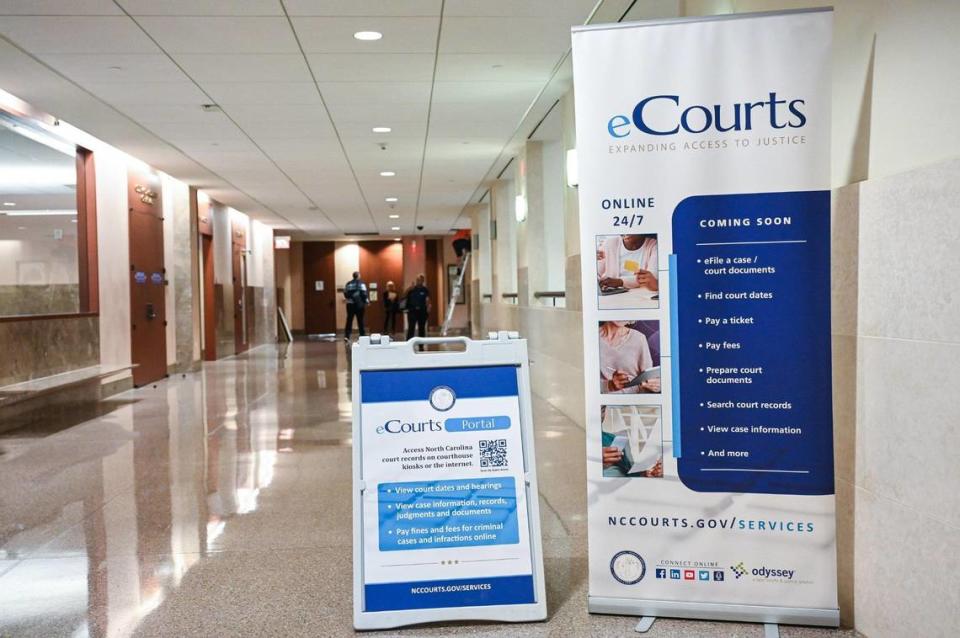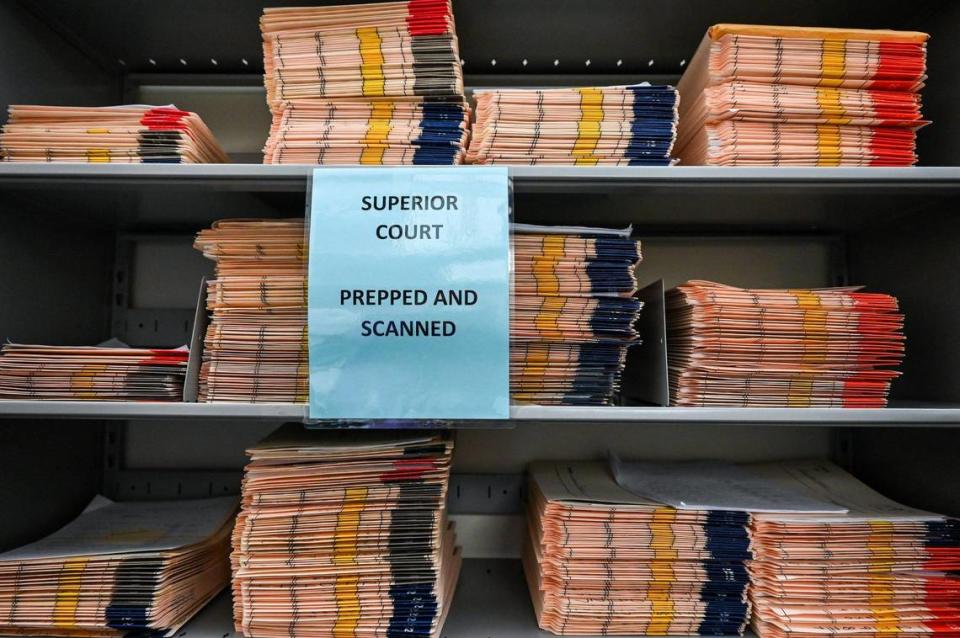NC man arrested on 14-year-old warrant — but it wasn’t right. Lawsuit blames court tech.
A recent filing in a lawsuit alleges that North Carolina’s new court records and case management system put a local man in jail for a years-old, cleared warrant — and created a slew of other problems.
After a rocky launch in four pilot counties earlier this year, eCourts launched in Mecklenburg County on Oct. 9.
ECourts has promised to transform North Carolina’s legal system by moving masses of paper records online. It allows lawyers, judges and clerks to do much of their work from computers. And it lets anyone with an internet connection browse records and even file some on their own.
But lawyers in the pilot counties — Wake, Harnett, Johnston and Lee — were quick to report slowdowns and glitches. Some defendants in those counties say they were wrongly arrested, and that their jail time was extended by eCourts’ shortcomings.
Now those suing are eyeing eCourts’ performance in Mecklenburg County, and taking aim at the office overseeing the rollout.
Mecklenburg County man arrested on years-old warrant
Mecklenburg County resident Allen Sifford is one of seven new plaintiffs to join the lawsuit.
An arrest warrant was issued for him in Gaston County in 2009, according to the complaint. It went unserved. In September 2022 he applied for a commercial driver’s license. When the state’s Division of Motor Vehicles denied his application because of the outstanding warrant, he hired an attorney to clear his record.
In October 2022 it was cleared “due to its age and the failure to serve the warrant,” the complaint says.
But when he was pulled over in July, officers told Sifford that the warrant still appeared active in eWarrants, the complaint says.

He spent more than two days in the Gaston County jail, the complaint says.
“Although his case has been formally expunged, he carries his dismissal paperwork everywhere,” the lawsuit says.
Sifford’s case takes aim at eWarrants, a piece of eCourts software that launched statewide last year.
Others have joined the proposed class action as plaintiffs:
Wake County resident Kevin Spruill says he was unlawfully detained twice. The Raleigh News & Observer documented Spruill’s case earlier in October.
Wake County resident Rotesha McNeil was arrested for a failure-to-appear warrant that should have been stricken, the lawsuit says. The N&O reported on her story, too.
Wake County resident Qiana Robertson was arrested for failing to appear in court. Neither she nor her attorney were given notice of a new court date, and the district attorney’s office could not explain “how the date change occurred,” the lawsuit says.
Wake County resident Yousef Jallal was arrested for failure to appear after his case was “incorrectly” designated as “called and failed.” His case had actually been dismissed, the lawsuit says.
Wake County resident Messiejah Bradley also had his charge dismissed, the complaint says. But his dismissal paperwork was “never reflected in Odyssey.” His case was marked as “called and failed,” and he was arrested for failing to appear. Odyssey is a case management system in eCourts.
Guilford County resident Robert Lewis was arrested on a dissolved restraining order, he says.
Lawsuit: Dozens unlawfully detained in Mecklenburg
In the first four days of eCourts’ Mecklenburg County launch, 66 people were “detained well beyond the point their conditions of release were satisfied,” the complaint says.
Wait times to get out of jail have grown dramatically, it alleges.
“Prior to eCourts, it would take, upon information and belief, anywhere from 2-4 hours for a detainee in Mecklenburg County to be released; but after eCourts, some people were held for 2-3 days despite having satisfied all conditions imposed on them by the justice system,” it says.
The cause? An “integration error” that leaves different pieces of eCourts’ software out of sync, confusing court staff and law enforcement about a defendant’s status, according to the complaint.
Mecklenburg County Chief District Court Judge Elizabeth Trosch detailed that error in an Oct. 17 email to lawyers and others in the criminal justice system.

The courthouse is taking extra steps to work around the problem, according to her email. And the North Carolina Administrative Office of the Courts — the state office overseeing eCourts’ implementation — has been providing daily reports on “integration failures” to courthouse leaders since Oct. 13, Trosch wrote.
The Charlotte Observer filed a public records request with the AOC for those reports last week. That request has not been fulfilled.
The complaint does not name suspects who spent extra time in jail. Without that information, Mecklenburg County Sheriff’s Office spokesperson Bradley Smith declined to comment on specifics.
ECourts has slowed down the process, though, Smith said in an email to The Observer last week.
“MCSO did run into issues that caused residents to wait longer to be released,” he said of launch week, later adding that delays were “still an issue.”
“Sheriff’s Office staff has to do more research and contact the courts when information does not match,” he said.
In court on Tuesday pertaining to an unrelated case, Sheriff Garry McFadden told The Charlotte Observer the problems with suspects seeing delays to leave jail after bond hearings come amid other stresses in the system. In particular, he said, having unfilled magistrate positions leads to longer wait times on a range of services, including setting bond and orders for release.
With the eCourts issues, he said, “Nobody can explain to me what happens a lot,” and McFadden said detention center staff and deputies are taking extra steps to address system shortcomings.
AOC, director named as defendants
ECourts was years in the making, and is costing North Carolina $100 million. The state’s AOC signed a 10-year contract with Texas-based vendor Tyler Technologies in 2019.
The suite of products the state purchased would help create “a virtual courthouse, where paper processes are a thing of the past and efficiencies are gained by Judicial Branch offices across North Carolina,” then-AOC interim Director McKinley Wooten said at the time.

But as the complaint notes, Tyler has faced a number of lawsuits. The alleged harms the vendor caused were “foreseeable,” those suing say.
Now AOC Director Ryan Boyce and the AOC itself are named as defendants in the lawsuit.
“We do not have any comment on the filings at this time,” AOC spokesperson Graham Wilson said in an email Oct. 30.
A lawyer representing Tyler Technologies said the company would also decline to comment.

